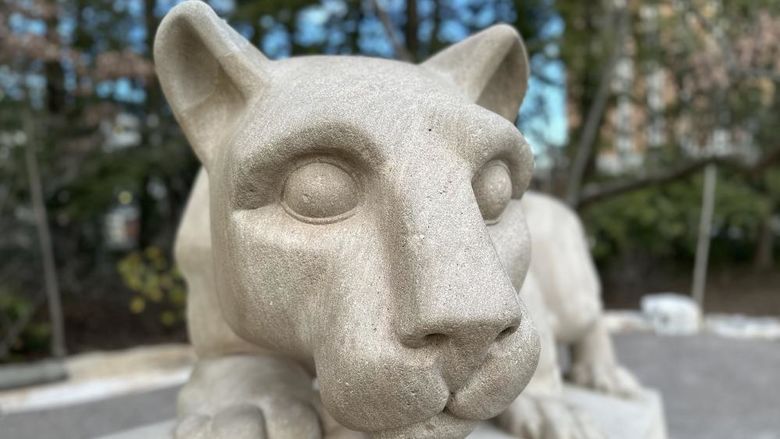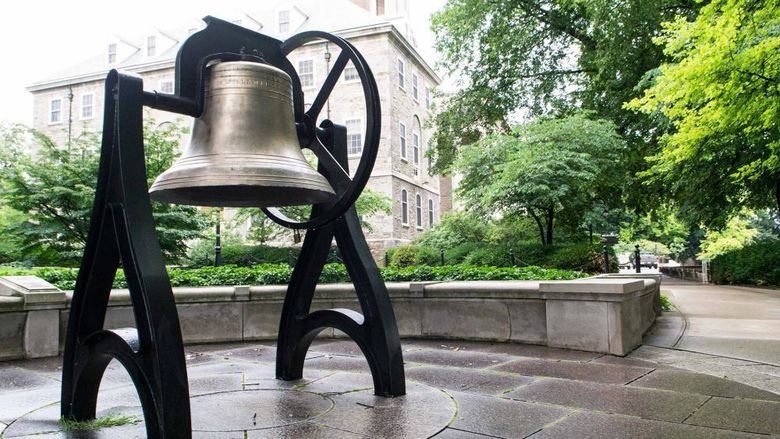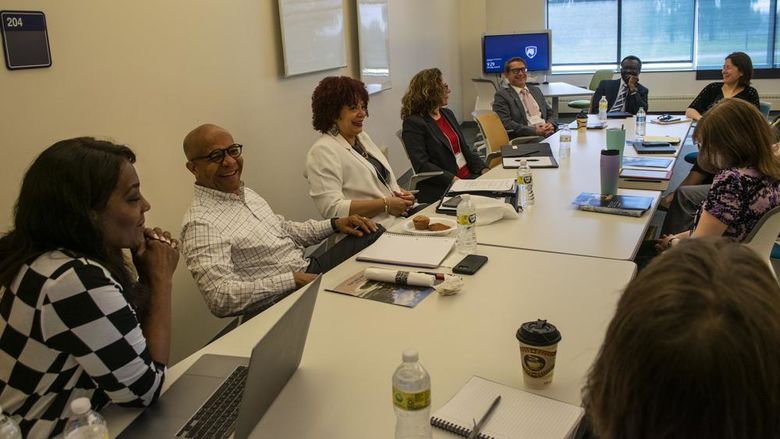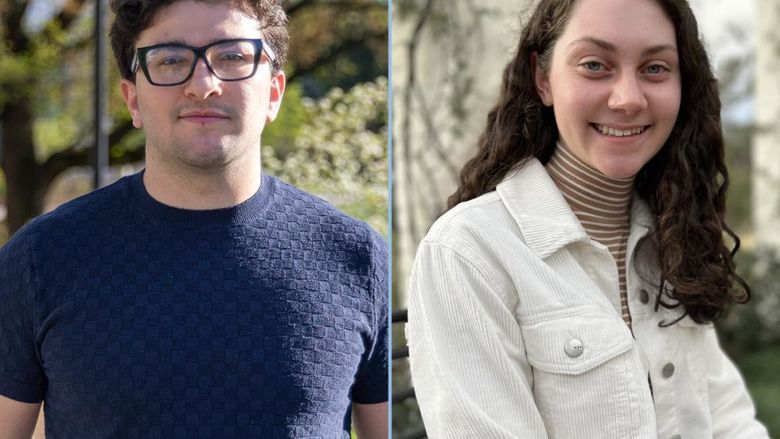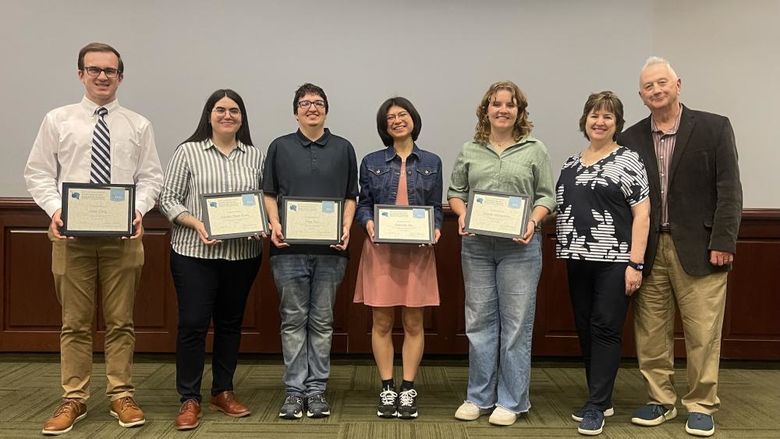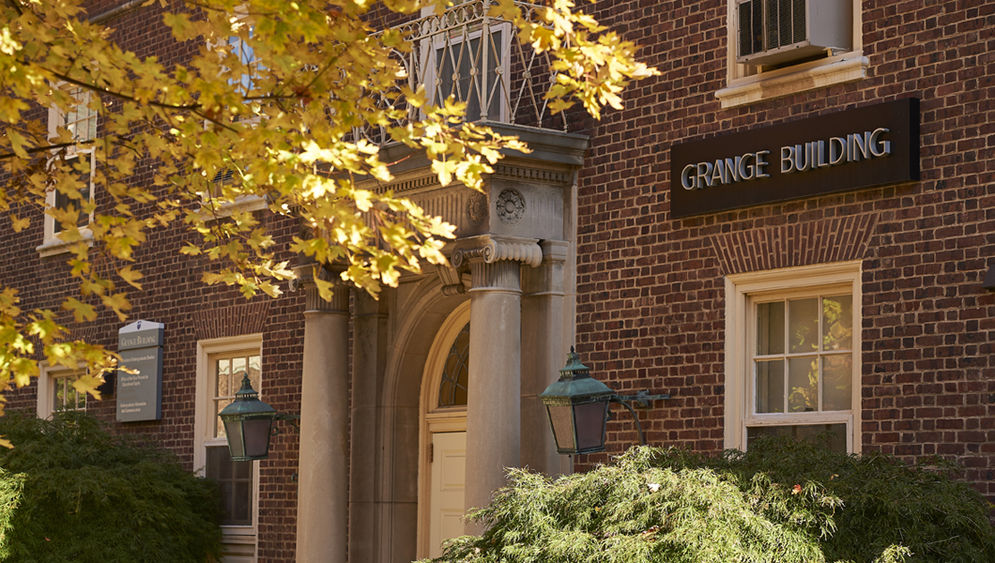
DUS students at any campus can apply for one of the DUS Scholarships starting in October.
UNIVERSITY PARK, Pa. — Five Division of Undergraduate Studies students earned scholarships this year for demonstrating a commitment to academic exploration.
The Division of Undergraduate Studies (DUS) is the academic home for students exploring their options at Penn State before committing to a program of study. DUS students can apply for the next round of DUS Scholarships starting in October.
Cecilia Figueroa
Cecilia Figueroa said starting her college career at DUS was the best choice she could have made. Although she knew she wanted to attend Penn State, she wasn’t confident about which major to choose. From her first semester, she said, she made a dedicated effort to explore every avenue to find the right major.
“The greatest and most valuable resource I have taken advantage of is the broad knowledge of my academic adviser,” Figueroa said. “I had my first meeting with my adviser the very first week of my freshman year, and that was when I learned I could count on her to guide me through my exploration process.”
Figueroa said she pored over what-if reports and websites and attended informational Zoom sessions to explore her options. She also talked to numerous people, from professors and other students to her friends’ parents.
“Sometimes I received answers that were incredibly helpful, sometimes I received answers that confused me even more, but knowing that I had people in my corner was incredibly comforting and helpful," she said. "Overall, my experience in DUS not only made me grow as a college student, it made me grow as a person. I learned that sometimes not knowing all of the answers is okay, and that there is no shame in asking for help and guidance.”
Figueroa has also been involved in THON committees and Women in Business, and works as a marketing coordinator at Avon Grove Library.
“While it may not always be easy to balance my academic life with my work life, having this job has been incredibly impactful on me,” she said. “I quickly realized that I wanted to study in the Smeal College of Business. However, I really did not know which major within Smeal to pursue. My experiences as marketing coordinator have led me to the conclusion that I am meant to study marketing at Penn State.”
Kyler Ito
Kyler Ito knew he wanted to study business, but it took deliberate exploration to lead him to his dual majors in finance and economics. Two courses, he said, were pivotal points for him: introduction to management information systems, which sparked an interest in the data-centric, technical side of business; and intermediate macroeconomics, which offered a deep dive into the complexities of policies and cycles, allowing him to understand how economic frameworks affect society on a grand scale.
“My curiosity extended to understanding how these theories applied to real-world economic issues like inflation and unemployment, and this newfound perspective confirmed that I wanted to pursue economics further,” Ito said.
Ito said he believed he could have benefited from a broader exploration of interdisciplinary courses earlier, such as philosophy or political science, to better view business through the lens of societal values and ethics.
“My advice to a first-year exploratory student is to adopt a mindset of openness and curiosity, even beyond their initial interests,” Ito said. “Trying out courses in unrelated fields can reveal unexpected connections and new passions, while also equipping you with a well-rounded perspective that will be invaluable in any career.”
He described his political science course as “one of the most enriching general education classes I took,” and said it provided him with knowledge of governance and ethics that he combined with his interest in current affairs. He was simultaneously enrolled in a social and ethical environment of business course, and said this intellectual journey complemented his studies for his intended major.
“Having the chance to analyze political theories alongside ethical business practices allowed me to gain a deeper, multidimensional understanding of societal responsibilities,” he said.
Ito is the chief networks officer at Advisory, a Singapore-based nonprofit. In this role, he helped to grow their professional network membership from 2,600 to 4,000 using strategic partnerships with firms and industry partners. He is also the founder and vice president of the Behrend Climbing Club.
Maya Ross
Maya Ross said she took a diverse range of courses as a DUS student, enrolling in art history and scientific policy to help inform her decision to eventually pursue a political science degree.
“Art history reinforced my interest in American society, while scientific literacy and policy developed my interest in how the public shapes laws,” Ross said. “Taking classes outside of political science allowed me to recognize the elements I enjoyed in each class. Thus, I realized that political science brings together those same characteristics.”
She described her academic adviser as “my most valuable resource” when exploring degrees.
“When I took an interest in a new topic, my adviser was one of the first to know. I was lucky to have her as my adviser because of her extensive knowledge. She thoroughly answered my questions and informed me of relevant campus events.”
One of those events was a pre-law information session, which she said made her consider attending law school in the future. Ross advised other DUS students to build relationships with their academic advisers and lean on them as a support system during confusing times.
She also said that students should avoid activities or courses that aren’t fulfilling them.
“College is a short period of one’s life that goes by in an instant,” she said. “Thus, it’s important to make the most of it and pursue things that align with one’s passions. Based on my experience at Penn State, the activities and classes one engages in, and the connections one builds, will contribute to their growth regardless of where one ends up.”
Outside the classroom, Ross has conducted undergraduate research on the demographics and background of national convention speakers and hopes to present at an upcoming conference. She is also on the DUS Leadership Council, a member of Climate Action Campaign, event coordinator for the WEBTOON club and a food service worker on campus. Her most significant position, she said, was working with Residence as an IDEA ambassador. In this role, she worked with a cohort of 16 ambassadors to create a welcoming environment for first-year students.
Ramin Khan, Joyce Buck Award Winner
Ramin Khan said he believes first-year exploratory students should enroll in diverse courses early on, “especially in fields you’re curious about but may know little about. Get involved in extracurriculars that align with potential interests and make use of networking opportunities to learn more about different career paths. Most importantly, don’t be afraid to pivot if something doesn’t resonate. Exploration is a journey, and it’s natural to shift directions as you learn more about yourself and your aspirations.”
When Khan arrived at Penn State, he said he felt pressure to pursue economics. He enrolled in DUS and committed to a structured but adaptable exploratory process. Khan also engaged with student organizations and talked to upper-level students with the goal of exposing herself to different career paths.
“My goal was to find a major that aligned with my strengths and desire for impactful work,” he said. “I began by enrolling in a variety of introductory courses across different disciplines — management, marketing, finance, economics, and psychology — to experience these fields firsthand and discover where my skills and interests aligned.”
Khan took PSYCH 120N: Knowing Right from Wrong, saying it had a “profound and lasting impact.” Taught by Eric Silver, professor of sociology and criminology, Khan said he enjoyed exploring the nature of moral ideals, beliefs and behaviors and learning about the evolution of moral reasoning, construction of ethical systems and the influence of moral emotions and intuitions on human behavior.
“This understanding has fundamentally shifted how I interpret and engage with the world around me,” Khan said.
Outside of academic work and student organization involvement, Khan served as a resident assistant in East Halls, was the fundraising chair for the Pakistan Student Association and served on the THON hospitality committee.
Wendy Huang
For Wendy Huang, connection with instructors from different academic fields helped guide her to her current majors of finance and accounting.
“My best piece of advice to first-year students would absolutely be to connect strongly with professors in different departments,” Huang said. “I believe that my biggest success was being able to work closely with them and really listen to why they were passionate about their chosen fields and then finding which I identified with most.”
Huang first entered Penn State Berks as a political science pre-major, but her research made her uncertain it was the right career path. She then enrolled in a wide variety of general education courses: geography and environmentalism, calculus, chemistry, biology, marketing and information technology systems.
Eventually Huang took marketing and management courses that stood out from the rest. When she expressed an interest in business to an instructor, he helped her create a project to market the campus theater program, working closely with a team to promote a production.
“Seeing the gratitude expressed by the hardworking theater team really emphasized to me how important marketing, or business, is,” Huang said.
Coming from California, Huang said she felt unsure if she would find people who shared her interests or culture. It was while working at campus dining that Huang met another student who would later join her to create the Asian Culture Club (ACC) at the Berks campus.
“To me personally, this experience has brought me closer to my own cultural identity and helped me feel more connected to Penn State’s community,” Huang said. “This year I have also become a resident assistant for many of the same reasons I founded ACC. I wanted to create a safe and open environment for residents, especially those far from home like me.”
The Division of Undergraduate Studies is part of Penn State Undergraduate Education.
